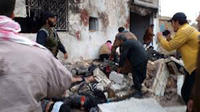-
The two-track Syria strategy of Iran and Hezbollah
For Iran and Hezbollah, the preservation of Bashar Assad regime is of supreme strategic importance, but both realize the regime may not survive. Iran and Hezbollah, therefore, employ two parallel strategic tracks. The first, immediate track aims to prop up the Assad regime’s ability to survive and continue governing by providing it with military, economic, political, and propaganda support. The second track, planned as an intermediate- and long-term strategy, aims to make it possible for Syria’s Shi’ites and Alawites to defend themselves by creating a “popular army.” To help the first track, Hezbollah has sent thousands of its best fighters to fight on the side of the Assad regime and help the regime keep its hold over areas in northwest Syria. To advance the second track, Hezbollah, with Iranian funding, is helping the Assad regime build and train a popular army of about 150,000 Alawite and Shi’a soldiers. This army will protect the interests of the Alawite and Shi’a communities – and the interests of Iran and Hezbollah — in Syria if the Assad regime falls.
-
-
Iowa City to ban red-light cameras, drones, license plate readers
Iowa City could become the first city in the United States to issue a sweeping ban on three law-enforcement technologies: drones, license plate readers, and red-light cameras. Privacy advocates say each of these technologies poses a threat to privacy, and the cumulative effect of using all three would turn America into a surveillance society.
-
-
Highly sensitive polymer detects IEDs

A chemical which is often the key ingredient in improvised explosive devices (IEDs) can be quickly and safely detected in trace amounts by a new polymer created by a team of Cornell University chemists. The polymer, which potentially could be used in low-cost, handheld explosive detectors and could supplement or replace bomb-sniffing dogs.
-
-
France weighing military options after French lab confirms Syrian use of sarin gas
Laurent Fabius, France’s foreign minister, said yesterday (Tuesday) that samples taken from Syria and tested in France confirm that sarin gas has been used by the Assad regime in several attacks in March and April. The U.K. Foreign Office said that samples from Syrian victims tested in British labs also confirmed the use of sarin. A UN investigative panel released its report yesterday, saying its experts had “reasonable grounds” to suspect small-scale use of toxic chemicals. Fabius said that France was not ruling out a military strike on the place where the gas is being stored.
-
-
Divided Supreme Court allows collection of DNA samples from suspects upon arrest
The Supreme Court on Monday, in a 5-4 decision, ruled that law enforcement is now allowed to take samples of DNA from people who have been arrested on suspicion of committing a serious crime.“Taking and analyzing a cheek swab of the arrestee’s DNA is, like fingerprinting and photographing, a legitimate police booking procedure that is reasonable under the Fourth Amendment,”Justice Anthony Kennedy wrote for the majority.
-
-
McCain: military aid to rebels, no-fly zone necessary as Assad gaining “upper hand”

Senator John McCain (R-Arizona) said it is “ludicrous” to believe that Syrian president Bashar al-Assad would negotiate a diplomatic solution to the county’s civil war at an upcoming summit. McCain says that providing military aid to the anti-Assad rebels and imposing a no-fly zone over Syria would more likely yield results than a summit meeting in Geneva.
-
-
Hagel says Chinese cyberattacks a “growing threat”
Defense Secretary Chuck Hagel warned of a “growing threat” of cyberattacks against the United States, saying that America and its allies need to “establish international norms of responsible behavior in cyberspace.” Hagel spoke to an audience of defense analysts and defense ministers from Asia and Europe at the annual conference of the International Institute for Strategic Studies on Saturday.
-
-
Flames change the sound of a firefighters' personal safety alarm
The PASS, short for Personal Alert Safety System, has been used by firefighters for thirty years to help track members of their team who might be injured and need assistance to escape a fire. Though the alarm has saved many lives, there are cases in which the device is working correctly but is not heard or not recognized.
-
-
Bloomberg group presses lawmakers to close FBI’s gun “terror gap”
New York City mayor Michael Bloomberg’s group, Mayors Against Illegal Guns, has turned its attention to Senators Kelly Ayotte (R-New Hampshire), Jeff Flake (R-Arizona), and Max Baucus (D-Montana) to gain their support for a gun bill which would prevent people on the U.S. terrorist watch list from passing background checks for guns.
-
-
Former CIA chief: NYPD surveillance would have prevented Boston-like attacks

Former CIA director Michael Hayden said a terror attack like the Boston Marathon bombings would never have taken place in New York City. Hayden, who also headed the National Security Agency (NSA), said the New York Police Department’s (NYPD) broad campaign of spying on the Muslim communities in the city would have helped officials identify the radical tendencies of the alleged bombers, thus preventing the attack.
-
-
Letters containing ricin sent to Mayor Michael Bloomberg, gun-control advocacy group

Two letters sent to Mayor Michael Bloomberg – one to his office in New York, the second to the Washington, D.C. offices of Mayors Against Illegal Guns, a non-profit gun-control group he has founded — contained traces of the deadly poison ricin.
-
-
Israel warns: if S-300 missiles arrive in Syria, Israel will “prevent” them from becoming operational
Israeli prime minister Benjamin Netanyahu said that if Russia went ahead with its planned sale of advanced S-300 air defense missiles to Syria, and these systems became operational, then Israel’s “entire airspace will become a no-fly zone.” Netanyahu warned that the threat was such that Israel “cannot stand idly by.”
-
-
Laser weapons on ships require reliable shipboard power
For the first time, a laser weapon system (LaWS) will be placed onboard a deployed ship, USS Ponce, for testing in the Persian Gulf in 2014. The U.S. Navy’s plan to put laser weapons on ships, makes the need for reliable, high-voltage shipboard power a matter of national security.
-
-
Smartphone technology to accelerate development of unattended sensors
DARPA wants to develop low-cost, rapidly updatable intelligence, surveillance, and reconnaissance (ISR) sensors – to be used by the military on the ground, in the air, at sea, and undersea – in less than a year, a marked improvement to the current three-to-eight year development process. It hopes to do so by using an original design manufacturer (ODM) process similar to that of the commercial smartphone industry.
-
-
Chinese government hackers steal designs of advanced U.S. weapons systems
The Chinese government has been conducting a broad, sustained, and disciplined campaign of cyberattacks against U.S. government agencies, critical infrastructure, private companies, and news organizations. The public version of a study prepared for the Pentagon by the Defense Science Board now says that Chinese government hackers have also been able to penetrate the computer networks of all the major U.S. defense contractors, stealing the designs and specifications of the most advanced weapon system in the U.S. arsenal, and gaining insights into broad technologies on which U.S. military advances are based.
-
More headlines
The long view
Are We Ready for a ‘DeepSeek for Bioweapons’?
Anthropic’s Claude 4 is a warning sign: AI that can help build bioweapons is coming, and could be widely available soon. Steven Adler writes that we need to be prepared for the consequences: “like a freely downloadable ‘DeepSeek for bioweapons,’ available across the internet, loadable to the computer of any amateur scientist who wishes to cause mass harm. With Anthropic’s Claude Opus 4 having finally triggered this level of safety risk, the clock is now ticking.”
“The Federal Government Is Gone”: Under Trump, the Fight Against Extremist Violence Is Left Up to the States
As President Donald Trump guts the main federal office dedicated to preventing terrorism, states say they’re left to take the lead in spotlighting threats. Some state efforts are robust, others are fledgling, and yet other states are still formalizing strategies for addressing extremism. With the federal government largely retreating from focusing on extremist dangers, prevention advocates say the threat of violent extremism is likely to increase.
Luigi Mangione and the Making of a ‘Terrorist’
Discretion is crucial to the American tradition of criminal law, Jacob Ware and Ania Zolyniak write, noting that “lawmakers enact broader statutes to empower prosecutors to pursue justice while entrusting that they will stay within the confines of their authority and screen out the inevitable “absurd” cases that may arise.” Discretion is also vital to maintaining the legitimacy of the legal system. In the prosecution’s case against Luigi Mangione, they charge, “That discretion was abused.”
Autonomous Weapon Systems: No Human-in-the-Loop Required, and Other Myths Dispelled
“The United States has a strong policy on autonomy in weapon systems that simultaneously enables their development and deployment and ensures they could be used in an effective manner, meaning the systems work as intended, with the same minimal risk of accidents or errors that all weapon systems have,” Michael Horowitz writes.
Ukraine Drone Strikes on Russian Airbase Reveal Any Country Is Vulnerable to the Same Kind of Attack
Air defense systems are built on the assumption that threats come from above and from beyond national borders. But Ukraine’s coordinated drone strike on 1 June on five airbases deep inside Russian territory exposed what happens when states are attacked from below and from within. In low-level airspace, visibility drops, responsibility fragments, and detection tools lose their edge. Drones arrive unannounced, response times lag, coordination breaks.
Shots to the Dome—Why We Can’t Model US Missile Defense on Israel’s “Iron Dome”
Starting an arms race where the costs are stacked against you at a time when debt-to-GDP is approaching an all-time high seems reckless. All in all, the idea behind Golden Dome is still quite undercooked.
